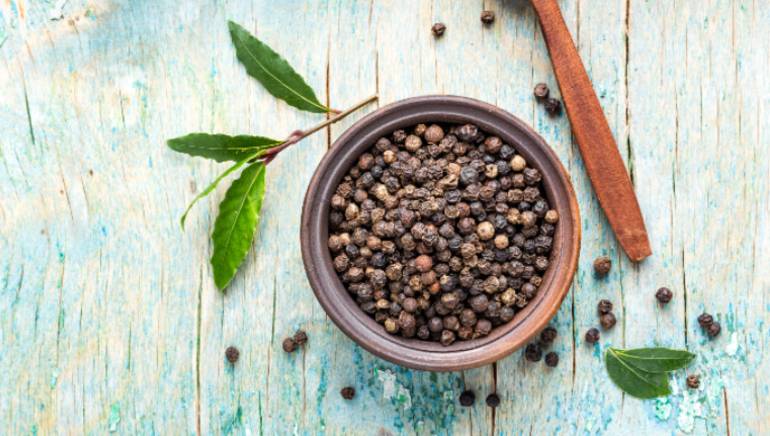Learn about six powerful Ayurvedic spices that help your body heal naturally and improve your overall health.
World Ayurveda Day is celebrated every year on September 23. This day helps us recognise the knowledge of Ayurveda, a holistic healing system originating in India. Ayurveda means “the science of life.” It focuses on a complete, natural approach to health and wellness. Ayurveda highlights the need for balance among the mind, body, and spirit. It uses natural ingredients to help maintain this balance. A key part of Ayurvedic medicine is the use of spices. These spices not only make food taste better but also offer many health benefits.
What is the most powerful spice for healing?
Here are six Ayurvedic herbs that can improve your well-being and help you heal naturally.
-
Turmeric (curcuma longa)
Healing properties: Rich in curcumin, turmeric is renowned for its anti-inflammatory and antioxidant properties. It helps combat oxidative stress and can significantly boost your immune system, as reported in the journal Nutrients. Turmeric aids in digestion and detoxification, supporting liver health.
Usage ideas by Dr J Hareendran Nair, Ayurveda Practitioner:
- Incorporate turmeric in curries, soups, or smoothies.
- Enjoy a warm cup of turmeric latte (golden milk) for soothing benefits.
2. Ginger (zingiber officinale)
Healing properties: Ginger is an exceptional spice known for its digestive benefits. It alleviates nausea, reduces bloating, and improves overall gut health. With its anti-inflammatory properties, ginger can help relieve pain and reduce muscle soreness, as per the International Journal of Preventive Medicine.
Usage ideas by Dr Nair:
- Brew ginger tea by steeping fresh ginger slices in hot water.
- Grate ginger into stir-fries or salads for a zesty kick.
3. Cinnamon (cinnamomum verum)
Healing properties: Cinnamon is celebrated for its ability to regulate blood sugar levels, making it beneficial for those with diabetes. It possesses antimicrobial properties, which can support oral health and fight infections, as per the Journal of Personalized Medicine.
Usage ideas by Ayurveda Practitioner:
- Sprinkle cinnamon on oatmeal or yoghurt.
- Add cinnamon sticks to warm beverages or herbal teas for added flavour.

4. Black pepper (Piper nigrum)
Healing properties: Known as the “king of spices,” black pepper enhances the absorption of nutrients and other beneficial compounds, particularly curcumin in turmeric. It has antioxidant and anti-inflammatory effects that support respiratory health, as reported in the International Journal of Preventive Medicine.
Usage ideas by Dr Nair:
- Use freshly ground black pepper over salads or roasted vegetables.
- A dash of black pepper in soups and broths can enhance the flavour profile.
5. Fennel seeds (foeniculum vulgare)
Healing properties: Fennel seeds aid digestion and can help alleviate bloating and gas. They are often consumed post-meal to promote digestive health. Rich in antioxidants, fennel can also help reduce inflammation and support heart health.
Usage ideas by Ayurveda Practitioner:
- Chew on fennel seeds as a natural breath freshener.
- Infuse fennel seeds in hot water for a soothing tea.
6. Fenugreek (Trigonella foenum-graecum)
Healing properties: Fenugreek seeds are known for their ability to lower blood sugar levels and improve insulin sensitivity, making them beneficial for people with diabetes. They also support lactation in breastfeeding women, providing essential vitamins and minerals that are crucial for their health and well-being, as per the Centers for Disease Control and Prevention.
Usage ideas by Dr Nair:
- Add soaked fenugreek seeds to salads or curries.
- Incorporate fenugreek powder into smoothies for added health benefits.
Tips for incorporating Ayurvedic spices
Here are some tips for incorporating Ayurvedic spices into your cooking and daily routine:
- Start small: Introduce one or two spices at a time into your diet to observe how your body responds.
- Quality matters: Opt for high-quality spices, preferably organic, to ensure you receive maximum health benefits.
- Balanced diet: Combine these spices with a balanced diet rich in fruits, vegetables, whole grains, and healthy fats for optimal wellness.
- Consult professionals: If you’re new to Ayurveda, consider consulting an Ayurvedic practitioner for personalised guidance.
Source link
Experts Say These Foods Support Brain Health and Memory
What Happens to Your Blood Sugar When You Eat ‘Naked Carbs’
Food writer shares simple ‘third grader rule’ that can make healthy eating much easier for anyone

